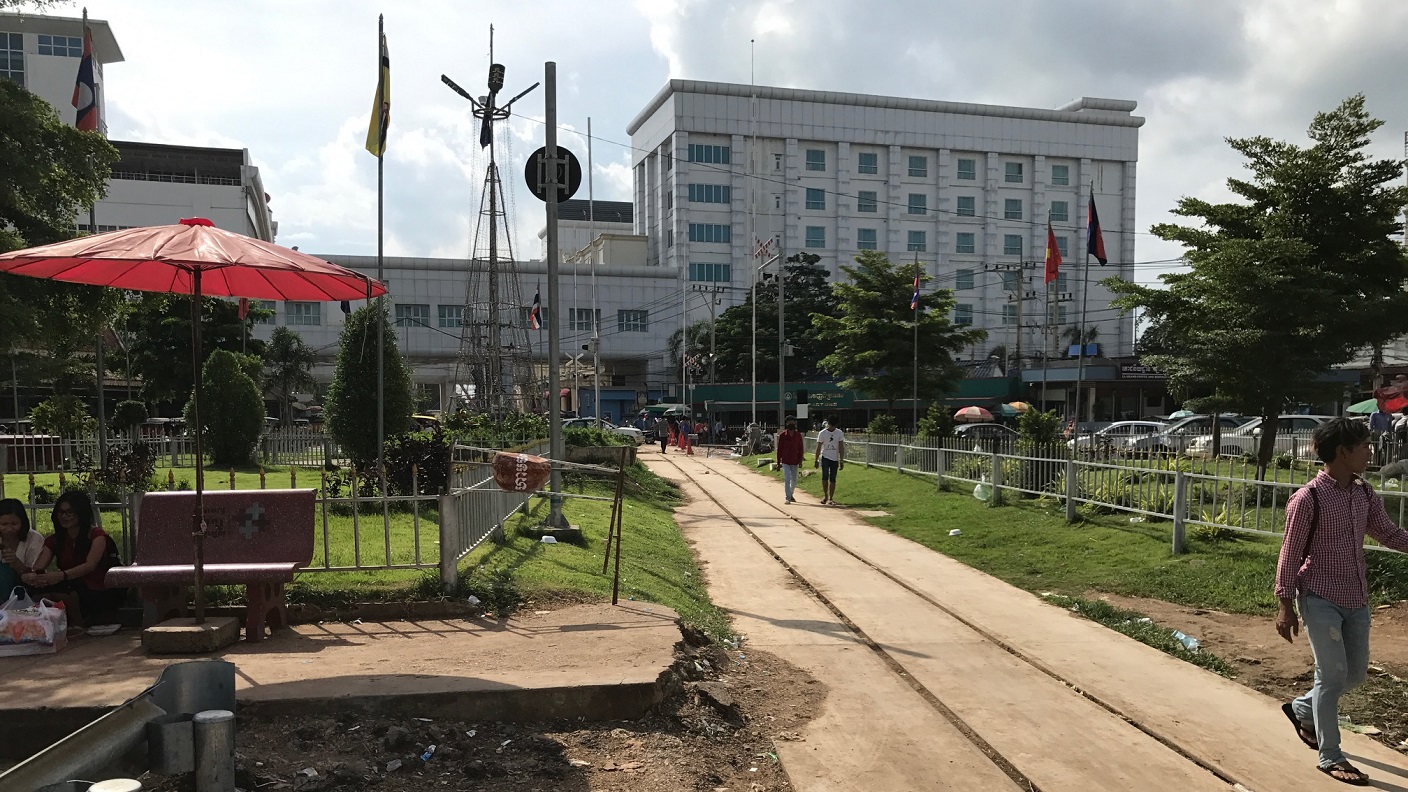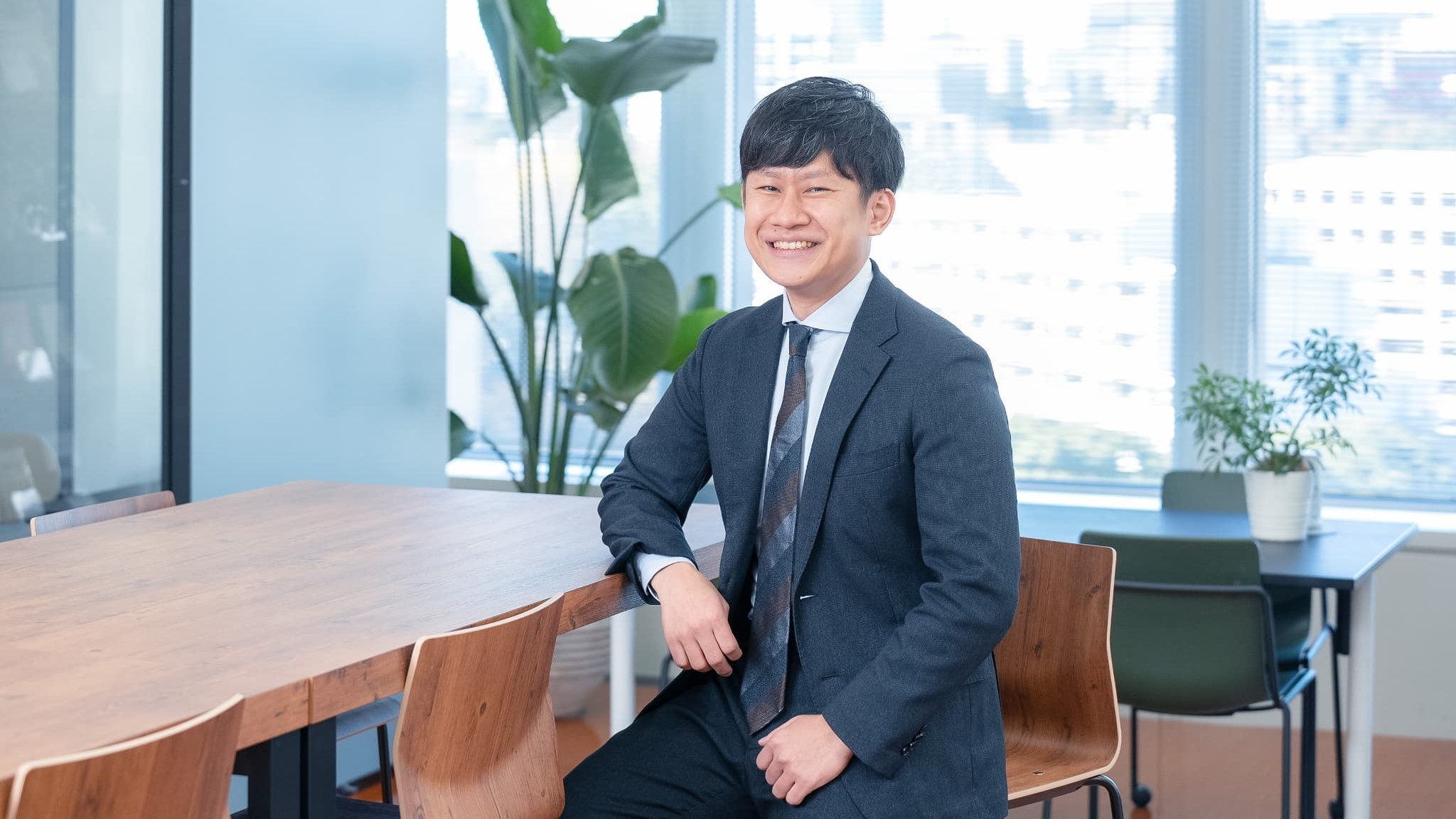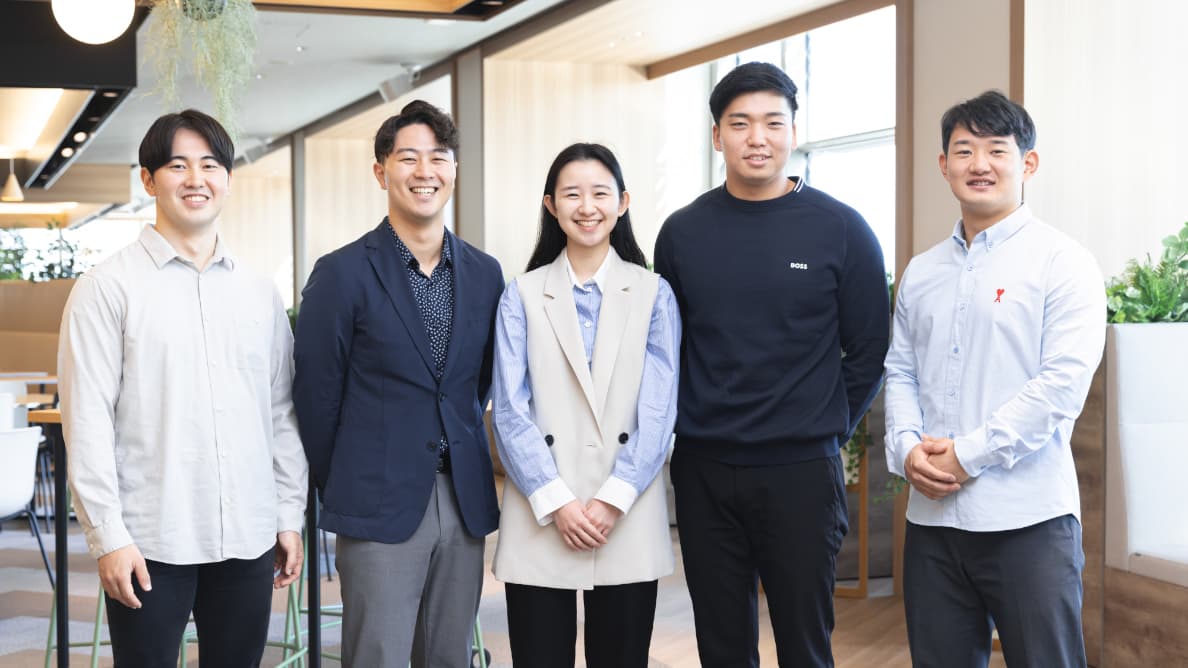
- TOP
- Enriching+TOP
- Expanding the electronics manufacturing service business in Cambodia
2023.10.1
Business
Expanding the electronics manufacturing service business in Cambodia
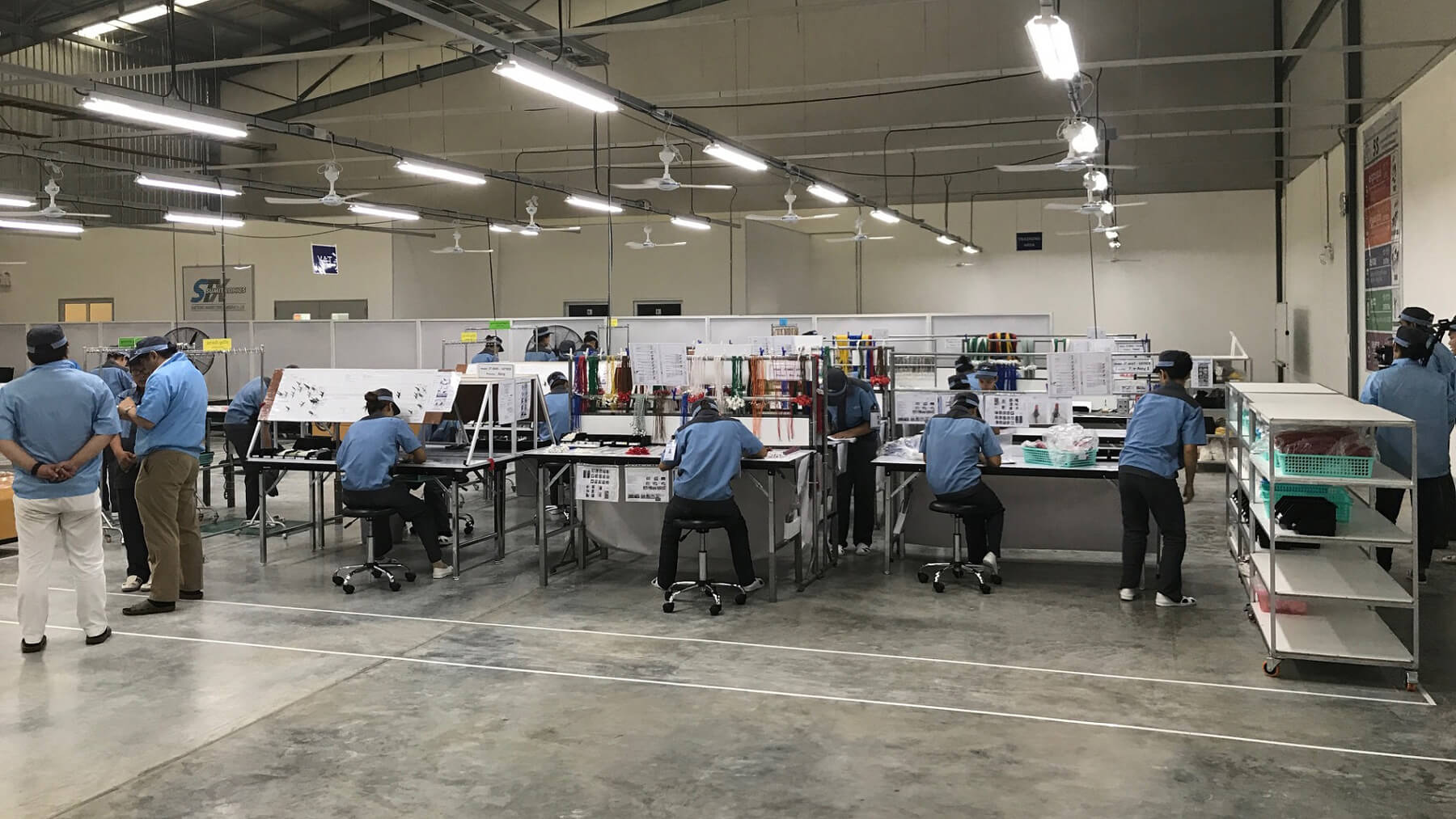
Sumitomo Corporation is expanding its electronics manufacturing service ("EMS") business in Cambodia via the Sumitomo Corporation Group business company Sumitronics Manufacturing (Cambodia) ("SMC"), which offers low-cost and reliable EMS to Japanese automotive component and appliance makers with manufacturing facilities in Thailand. SMC has moved into Cambodia ahead of other Japanese EMS providers, starting up operations in January 2017 in the Sanco Poipet Special Economic Zone situated near the border with Thailand. With a total staff of 35-25 factory employees and 10 office employees—the company primarily manufactures cables for gas equipment and electronic components for household appliances. I paid a visit to the facility in late July.
This content was originally published in December 2017.
-

Mass Media Relations Team, Corporate Communications Department
Masaru Mitsuhara
He joined Sumitomo Corporation in 2011 and, as a member now of the Mass Media Relations Team, he is responsible for matters pertaining to the Metal Products Business Unit, the Transportation & Construction Systems Business Unit, the Food & Agriculture Business Division, and the Materials, Supplies & Real Estate Business Division. When his posting in Singapore came to an end in June 2017, he was surprised to learn that his new assignment upon returning to Japan would be the Corporate Communications Department, but he takes great pleasure now in being able to study matters from a company-wide perspective. Although officially on the roster of Sumisho's Basketball Club, he has become a phantom member, with childrearing having become his latest passion.

Crossing the border from Thailand and heading to the facility site
The Cambodian border is about four hours by car east of Thailand's capital of Bangkok. We drove on relatively smooth roads, passing through peaceful scenery featuring sugar cane fields and (wild?) cows grazing. Along the way we entered the Southern Economic Corridor, an international highway in Southeast Asia on par with the North-South Economic Corridor and the East-West Economic Corridor that connects Bangkok (Thailand), Phnom Penh (Cambodia) and Ho Chi Minh City (Vietnam), all major cities with populations over two million, and it is known for being the corridor generating the greatest economic benefits. Via this project, these countries have cooperated to improve transport infrastructure as tariffs are being eliminated in the ASEAN region, and ODA from Japan has been put to good use here. Large trucks cross over the border non-stop, and I got a first-hand look at the artery of the southern ASEAN economy.
As we cleared immigration and entered Cambodia, the asphalt road disappeared (we were no longer in the Southern Economic Corridor). We had arrived in the city of Poipet. A mixture of large trucks and buses moved along the dirt road, and seeing men pulling goods-laden carts and child street vendors brought to my mind the expression "Asia's poorest country." Only 13 Japanese reside in Poipet, where I stayed in one of the few hotels offering hot showers and prepared for the next day.
Visiting the factory
SMC has leased a rental factory in the Sanco Poipet Special Economic Zone and set up a 1,000 m² production facility. The factory was only just completed in September of last year, and the exterior was quite clean. At 8:00 am, a steady stream of employees wearing blue SMC uniforms showed up for work, all of them returning my greetings with a smile. The majority of companies in Cambodia do not have uniforms, so wearing a uniform apparently imparts a certain degree of status. SMC's uniforms are regarded by the employees as having a cool design. Once everyone had shown up, the morning assembly began; monthly target figures, assembly procedures, and yield targets were then all confirmed. The average age of the employees is a young 20.5 years and a number of them still retained a youthful innocence, but all of the employees formed up neatly in a line with serious looks on their faces.
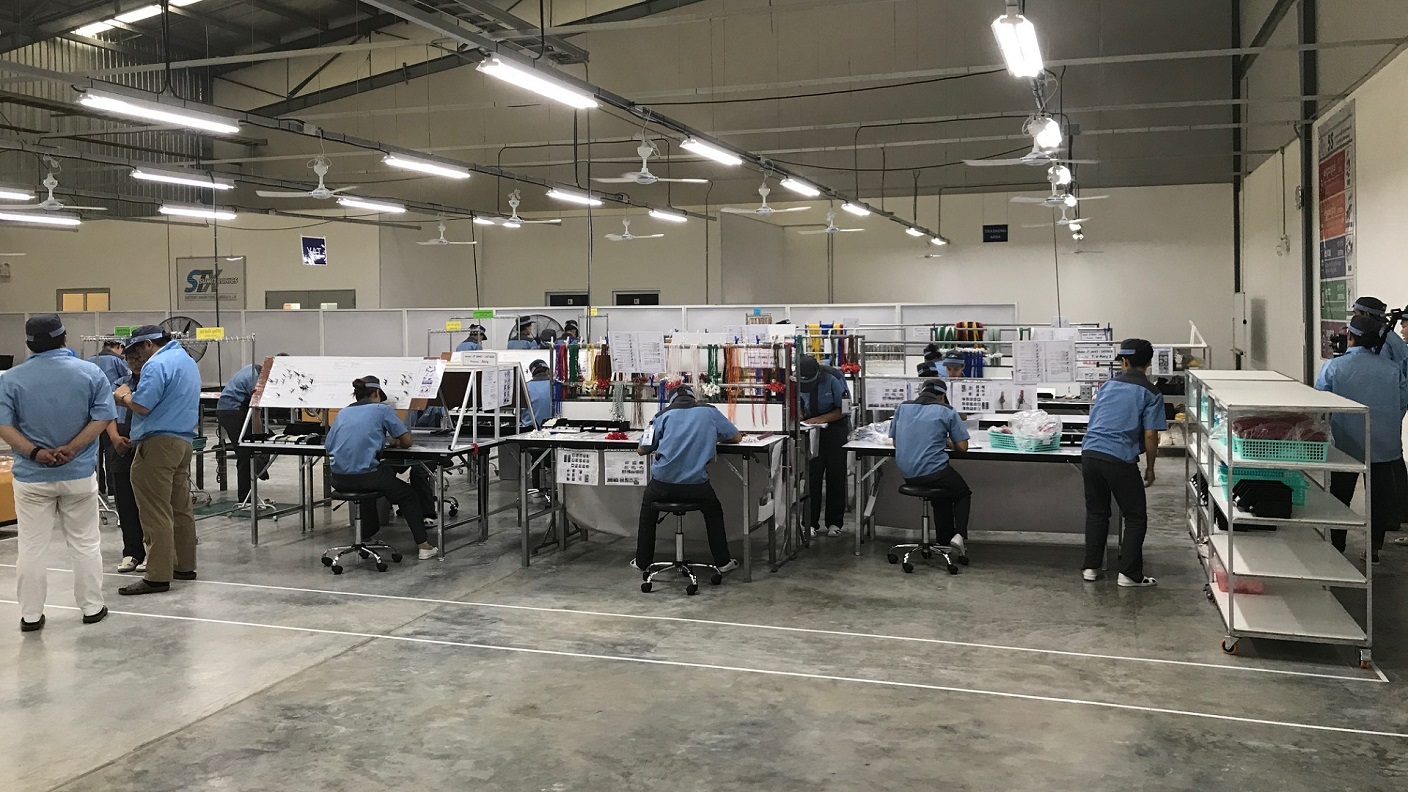
The employees then dispersed to their respective stations and began their work. SMC processes electronics parts supplied from Thailand. With training in the capable hands of a Thai manager transferred in from the Thailand factory and several leader-class staff trained for two months at the Thailand factory immediately after being hired, the employees are picking up skills through OJT. Attaching 10 different types of wires to connectors held in one hand and twisting and bunching wires may appear to be simple tasks, but in fact a significantly high level of skill is needed. The assembled products undergo quality inspections, as they are to be delivered to Japanese manufacturers in Thailand who have extremely high quality requirements. There are few cases in which products able to pass these quality inspections can be made from the outset, but the employees seem to be committed to stepping up their efforts on a daily basis.
The truck’s arrived!
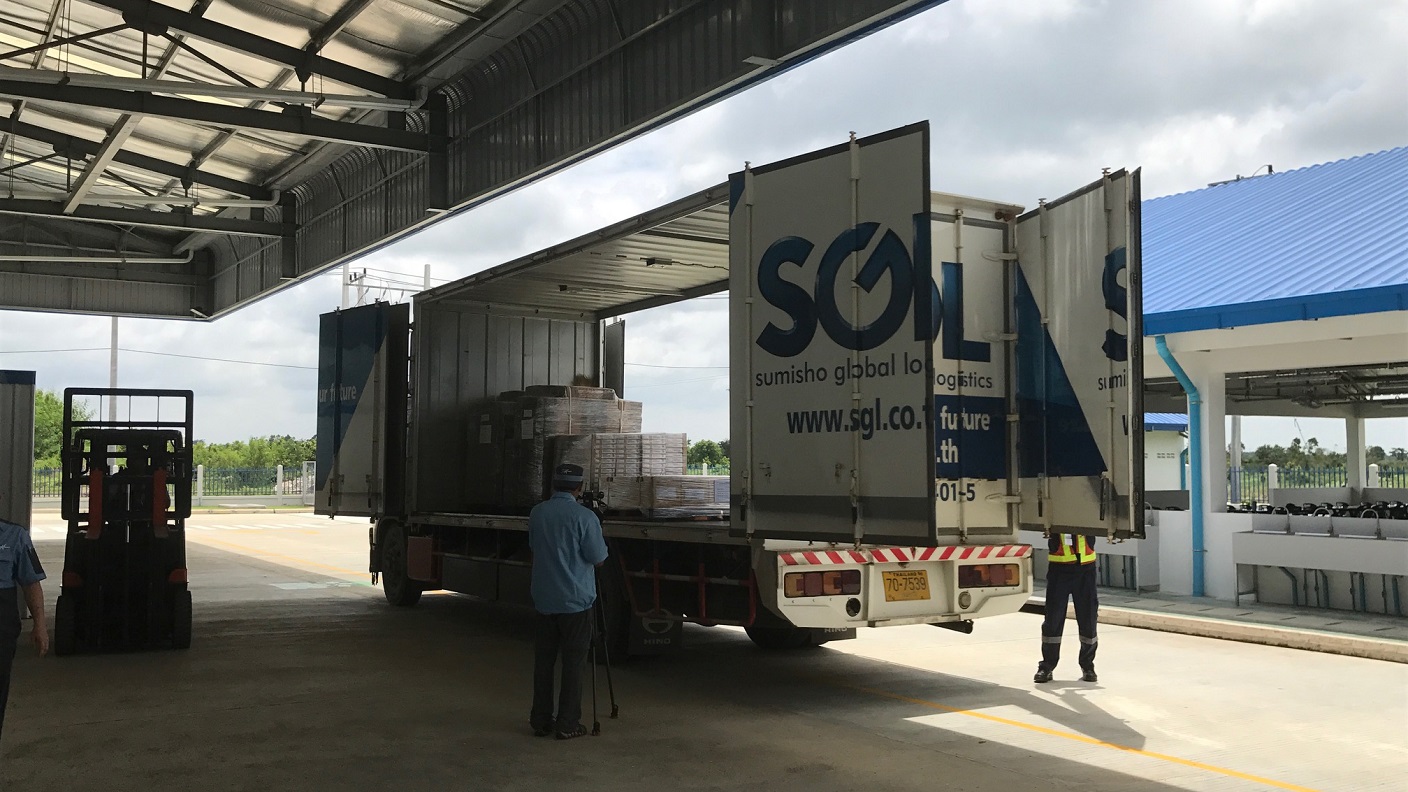
The Cambodian government has preferentially granted tariff exemptions and a variety of other benefits to Qualified Investment Project ("QIP") companies, and SMC is among those receiving these benefits. The products assembled at the SMC factory are transported by truck to Thailand, and then delivered to Japanese automotive component and appliance manufacturers operating in Thailand. To cut logistics costs, the assembled products are loaded onto trucks used to carry parts from Thailand to Cambodia for "piston transport" back to Thailand. I witnessed components being taken off from a truck belonging to Sumisho Global Logistics, a Sumitomo Corporation Group business company, and products loaded onto the truck. Particular attention was exercised when loading products onto the truck. The employees carefully and skillfully operated forklifts to place the products in the center of the truck bed; if the cargo leans either left or right, products will collide with the inner wall of the truck bed, increasing the probability that they will be damaged. Of course, all truck drivers are required to engage in safe driving practices. As I watched the truck filled with products slowly leave the factory behind, I prayed they would arrive in Thailand without incident.
Supporting economic development in the ASEAN region
The launch of the ASEAN Economic Community at the end of 2015 is expected to boost economic development in Southeast Asia. Cambodia has an abundant young workforce that is even cheaper than Thailand's, so some of Sumitronics Thailand's operations were transferred over to SMC. This allows the Thailand factory to focus its efforts on high value-added products. The manufacture of existing products has thus been moved to Cambodia, while the Thailand factory has shifted to high-end production. This compartmentalization between the two countries is intended to achieve the most efficient manufacturing by product lineup. SMC is hoping over the long term to begin manufacturing automotive products currently being manufactured in the Thailand factory.
SMC currently has 25 factory workers, and I heard that 60 applicants showed up in one evening when 20 positions were to be filled. Quite a few employees say that they wanted to work for a Japanese company because they like Japan. There are many Chinese and Thai companies operating in the area, too, but Japanese companies have made an especially good impression on the locals. The employees who managed to make it through the narrow hiring criteria are all serious, none of them showing up late for work in the mornings. Having been posted before in Southeast Asia myself, I was greatly surprised that worker tardiness was not a problem. The fact that the employees are good with their hands has helped establish a reliable production regime.
Inside the factory hung large signs touting 5S (sort, set in order, shine, standardize and sustain) slogans used to improve workplace environments in the manufacturing industry. Employees commented on the fact that the workplace environment is clean and that they are guaranteed sufficient holidays, and SMC's business enjoys a very good reputation locally from the perspective of job creation opportunities. To expand its business, SMC is planning to set up its own factory in the Poipet-Phnom Penh Special Economic Zone now under construction. By establishing cross-national manufacturing operations and by creating jobs, SMC is helping support ASEAN's economic development.
(Bonus) A Corporate Communications Department staff member explores Poipet
At a later date, I visited the Casino Village in Poipet, built with capital that poured into the city from Thailand before legislation had been put in place. It featured enormous buildings, and its neon lights give it an overwhelming sense of presence. I saw the casino employees showing up for work in the evening (the Casino Village has apartments exclusively for its employees). While local residents may have been forced off their land when construction began, the Casino Village is now a wonderful source of employment.
When I visited the construction site for the Thailand-Cambodia railway, I heard that nearly all of the rail line on the Thai side of the border had been completed. Rails are still being laid in Poipet, the railway's Cambodia terminus. Once the railway has opened, people without cars or motorcycles will be able to travel without encountering road congestion at the border. Everyone is looking forward to that day.
